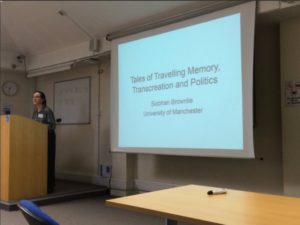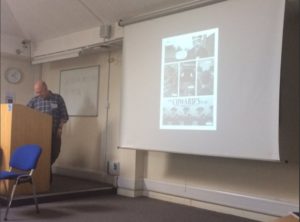Charlotte Walmsley (Cardiff) discusses a recent conference held at Cardiff University: ‘Transnational Memory, Translation and Adaptation’
On 31 May, Cardiff University hosted a conference on ‘Transnational Memory, Translation and Adaptation’, with the support of the Institute of Modern Languages Research and the Centre for the Study of Cultural Memory. This one day event was organised by a committee of PhD students based at Cardiff University’s School of Modern Languages, which included me, Nicolas Martínez and Stephanie Munyard.
The conference emerged from our hopes to bring together two burgeoning fields in Modern Languages research: Memory Studies, and Translation & Adaptation Studies. As Dr Siobhan Brownlie highlights in her innovative study Mapping Memory in Translation (2016), these ‘boom areas’ are rarely brought into dialogue, despite the productive potential of examining the influence of memory on cultural production, transmission, translation and adaptation. Cultural and linguistic products, such as translations and adaptations, are ‘vessels of historical memory’ (Brownlie 2016: 1); they participate in memory politics across different spaces and time periods. During our one day conference, we wanted to bring to light and theorise the multiple intersections between processes of cultural production and memorialisation.
The conference featured two keynote speakers, Dr Siobhan Brownlie from the University of Manchester and 2015 Eisner nominee and graphic novelist, Jonathan Clode, alongside early career academics and PhD researchers from across an array of disciplines, including Modern Languages, Creative Writing and English Literature.
Dr Siobhan Brownlie’s keynote on the topic of ‘Tales of Travelling Memory, Transcreation and Politics’, explored the migratory nature of cultural memory. Brownlie examined Refugee Tales (2016), a collection of refugees’ stories orally recounted to authors who then adapted them into text, as a case study of what she defines as ‘travelling memory’. Brownlie drew parallels between the physical act of border crossing undertaken by refugees, and the process of transmitting their stories to audiences across both concrete and cultural borders.
Panels focused on three key themes: multilingualism and transnational heritage; adapting traumatic and politically divisive memory; and shifts in translations and adaptations through time. Discussions during the first panel centred on language use as a site of political and cultural contestation in multilingual contexts and the potential weaponisation of translation. The second panel elucidated the challenge of adapting historical trauma to text, and the politics of representing experiences coded as unrepresentable or unspeakable. The final panel examined how changing cultural and memory landscapes can alter the construction and transmission of texts, raising interesting questions about what shifts and what remains static in memorialisation, translation and adaptation.
Jonathan Clode’s final keynote of the day illuminated the creative process of crafting stories from memories. Clode talked us through the inception, production and transmission of To End All Wars: A Graphic Anthology of The First World War (2014), highlighting the role of the graphic novel to preserve memories, portray hidden lives and provide catharsis for the creators themselves.
We ended the day with a cheese and wine reception, to give time to mull over the discussions of the day and continue conversations. It was wonderful to welcome early career and PhD researchers from across the UK, alongside academics and writers working in multiple fields. Overall, the event was a great success and offered an exciting opportunity for interdisciplinary discussion and exchange, while showcasing innovative scholarship on the themes of memory, translation and adaptation. The IMLR was thanked for its support.
Works cited:
Brownlie, S (2016) Mapping Memory in Translation (New York: Palgrave Macmillan)
Charlotte Walmsley, Cardiff University


